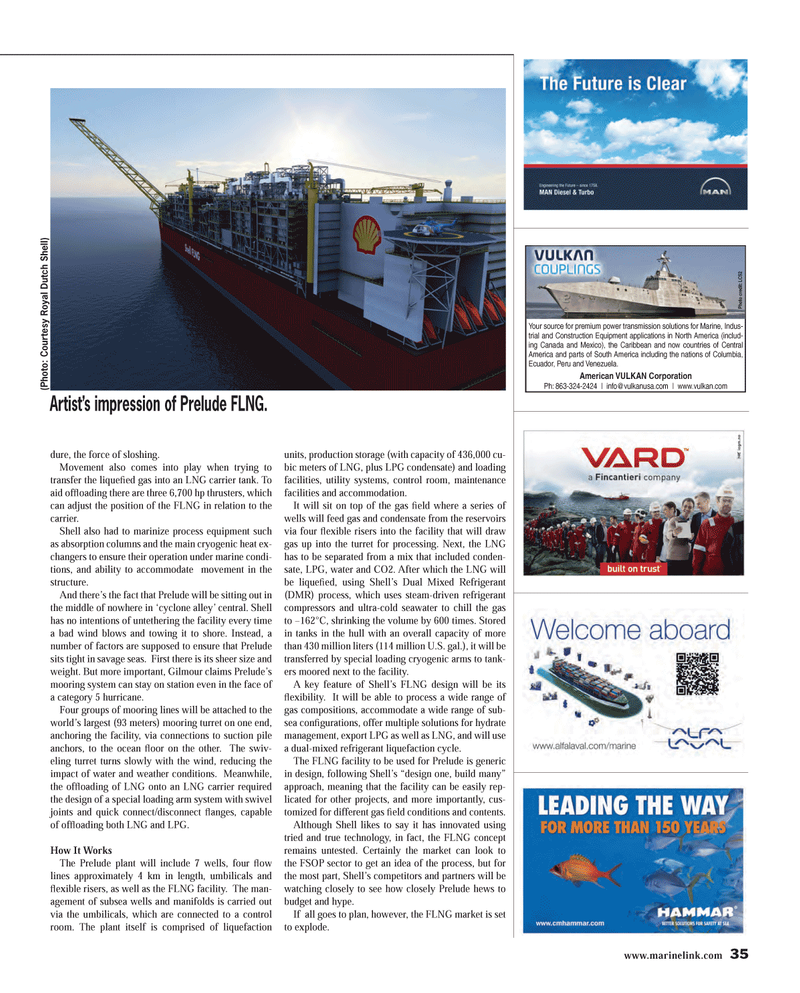
Page 35: of Maritime Reporter Magazine (July 2014)
Offshore Energy Structures & Systems
Read this page in Pdf, Flash or Html5 edition of July 2014 Maritime Reporter Magazine
www.marinelink.com 35
American VULKAN Corporation
Ph: 863-324-2424 | [email protected] | www.vulkan.com
Your source for premium power transmission solutions for Marine, Indus- trial and Construction Equipment applications in North America (includ- ing Canada and Mexico), the Caribbean and now countries of Central
America and parts of South America including the nations of Columbia,
Ecuador, Peru and Venezuela.
Photo credit: LCS2
American Vulkan MR Jan14.indd 1 12/19/2013 9:55:54 AM dure, the force of sloshing.
Movement also comes into play when trying to transfer the liquefi ed gas into an LNG carrier tank. To aid offl oading there are three 6,700 hp thrusters, which can adjust the position of the FLNG in relation to the carrier.
Shell also had to marinize process equipment such as absorption columns and the main cryogenic heat ex- changers to ensure their operation under marine condi- tions, and ability to accommodate movement in the structure.
And there’s the fact that Prelude will be sitting out in the middle of nowhere in ‘cyclone alley’ central. Shell has no intentions of untethering the facility every time a bad wind blows and towing it to shore. Instead, a number of factors are supposed to ensure that Prelude sits tight in savage seas. First there is its sheer size and weight. But more important, Gilmour claims Prelude’s mooring system can stay on station even in the face of a category 5 hurricane.
Four groups of mooring lines will be attached to the world’s largest (93 meters) mooring turret on one end, anchoring the facility, via connections to suction pile anchors, to the ocean fl oor on the other. The swiv- eling turret turns slowly with the wind, reducing the impact of water and weather conditions. Meanwhile, the offl oading of LNG onto an LNG carrier required the design of a special loading arm system with swivel joints and quick connect/disconnect fl anges, capable of offl oading both LNG and LPG.
How It Works
The Prelude plant will include 7 wells, four fl ow lines approximately 4 km in length, umbilicals and fl exible risers, as well as the FLNG facility. The man- agement of subsea wells and manifolds is carried out via the umbilicals, which are connected to a control room. The plant itself is comprised of liquefaction units, production storage (with capacity of 436,000 cu- bic meters of LNG, plus LPG condensate) and loading facilities, utility systems, control room, maintenance facilities and accommodation.
It will sit on top of the gas fi eld where a series of wells will feed gas and condensate from the reservoirs via four fl exible risers into the facility that will draw gas up into the turret for processing. Next, the LNG has to be separated from a mix that included conden- sate, LPG, water and CO2. After which the LNG will be liquefi ed, using Shell’s Dual Mixed Refrigerant (DMR) process, which uses steam-driven refrigerant compressors and ultra-cold seawater to chill the gas to –162°C, shrinking the volume by 600 times. Stored in tanks in the hull with an overall capacity of more than 430 million liters (114 million U.S. gal.), it will be transferred by special loading cryogenic arms to tank- ers moored next to the facility.
A key feature of Shell’s FLNG design will be its fl exibility. It will be able to process a wide range of gas compositions, accommodate a wide range of sub- sea confi gurations, offer multiple solutions for hydrate management, export LPG as well as LNG, and will use a dual-mixed refrigerant liquefaction cycle.
The FLNG facility to be used for Prelude is generic in design, following Shell’s “design one, build many” approach, meaning that the facility can be easily rep- licated for other projects, and more importantly, cus- tomized for different gas fi eld conditions and contents.
Although Shell likes to say it has innovated using tried and true technology, in fact, the FLNG concept remains untested. Certainly the market can look to the FSOP sector to get an idea of the process, but for the most part, Shell’s competitors and partners will be watching closely to see how closely Prelude hews to budget and hype.
If all goes to plan, however, the FLNG market is set to explode.
Artist’s impression of Prelude FLNG. (Photo: Cour tesy Royal Dutch Shell)
MR #7 (32-41).indd 35 7/1/2014 10:58:21 AM

 34
34

 36
36
